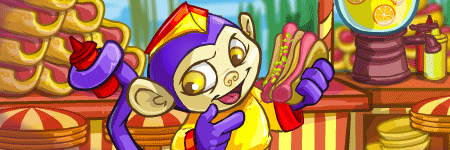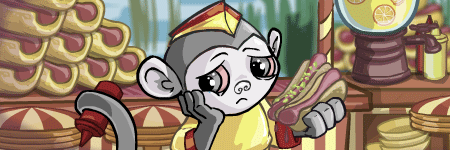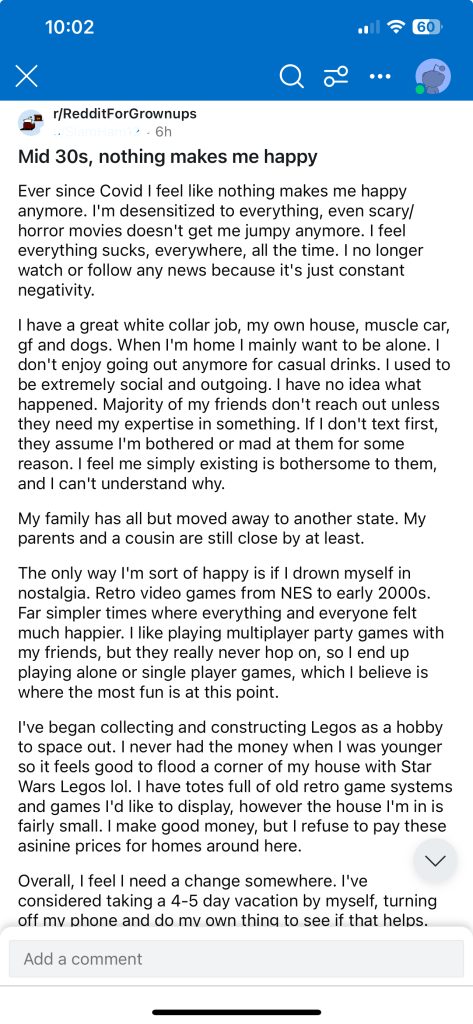Well hello there, long time no see.
Discussing depression is a pretty regular thing when you’re a therapist — when over 8% of the US population has a diagnosis of major depressive disorder, you can be rest assured it’s pretty common.
The DSM-5 criteria for a diagnosis of depression are as follows:
The individual must be experiencing five or more symptoms during the same 2-week period and at least one of the symptoms should be either (1) depressed mood or (2) loss of interest or pleasure.
1. Depressed mood most of the day, nearly every day.
2. Markedly diminished interest or pleasure in all, or almost all, activities most of the day, nearly every day.
3. Significant weight loss when not dieting or weight gain, or decrease or increase in appetite nearly every day.
4. A slowing down of thought and a reduction of physical movement (observable by others, not merely subjective feelings of restlessness or being slowed down).
5. Fatigue or loss of energy nearly every day.
6. Feelings of worthlessness or excessive or inappropriate guilt nearly every day.
7. Diminished ability to think or concentrate, or indecisiveness, nearly every day.
8. Recurrent thoughts of death, recurrent suicidal ideation without a specific plan, or a suicide attempt or a specific plan for committing suicide.
To receive a diagnosis of depression, these symptoms must cause the individual clinically significant distress or impairment in social, occupational, or other important areas of functioning. The symptoms must also not be a result of substance abuse or another medical condition.
Today, we’re discussing a symptom that’ll make even the most pleasure-seeking among us go, “What the fuck?!” Enter anhedonia—a fancy-ass term for the joyless void that can come with depression. See #2 up on that list there? Let’s simplify and explore it.
One of the biggest misconceptions I hear from folks about depression is an oversimplification, almost a caricature, of what it’s “supposed” to be.
“Depression is wanting to kill yourself,” “Depression is not wanting to do anything,” “Depression is lying in bed all day.”
Well, sure, we look at the list above and it can be, but it can also look like the following post from Reddit I just saw today.
I get the coping strategy of saying “Depression is XYZ” because then that means I can’t possibly be depressed, right? (Because it looks like this other thing, duh.). But, like, yeah, it’s so common you kinda… might be?
That’s why I’m here to talk about the insidious symptom of anhedonia because it feels like quite a few people might be experiencing it and not really know how to put a finger on it.
Anhedonia is like the ultimate buzzkill. It’s when you lose interest or pleasure in things that used to make you do some happy dance. Picture your favorite food suddenly tasting as bland as cardboard, your go-to jam feeling like dull noise, or even sex feeling about as exciting as watching paint dry.
Now, we’ve all experienced the above before: off days, periods in our life where nothing really seems appealing, times in our life when so much is going on we can’t hardly bear to focus on things we used to enjoy. Does this mean I’m depressed? Well, if you look at the above diagnostic criteria, they specify that the symptoms must be long-ish lasting, and must not arise as a result of another disorder. So, the lack of desire you feel after a huge life event like the birth of a kid, or sleepless nights before the bar exam, or after your grandma passes away — these are more likely attributable to the circumstances ongoing and their effects rather than depression. It’s fair to note that sometimes these circumstances can trigger a depressive episode (postpartum depression, or a depressive episode following a trauma, to name a few). But sometimes, anhedonia arises as a result of circumstances, and can resolve on its own without becoming longstanding. So feeling anhedonia does not necessarily mean depression, particularly if it’s an isolated incident.
One other factor: sometimes anhedonia can be attributable to other disorders, so it might not point to depression in those cases, too. But it is a pretty big clue pointing to the ol’ MDD. I’ve experienced anhedonia as an accompaniment to feeling burnt out from long workdays that come up sometimes, because I haven’t had enough sleep on some days, and because my brain has such decision paralysis sometimes from inattention that I can’t hardly decide to do something I love. I would say in those cases it’s not depression because it can be more easily explained by something else going on. That’s ok.
Anyways. Anhedonia is a sneaky little bastard and often shows up as one of the main symptoms of depression. When depression crashes the party, it can bring a whole slew of symptoms, like feeling sad, fatigued, and about as motivated as a sloth on sleeping pills. Around 70% of folks with depression experience the joy-sucking effects of anhedonia.
Losing pleasure in things sucks. And it can be insidious, creeping up on you like it does on the aforementioned poster. One day you realize nothing’s really lighting the fire, and you haven’t done something for yourself like get an ice cream or check out a new A24 movie in a while, and really, you can’t be arsed to.


Without pleasure and interest, life can seem really boring, dull, and meaningless. You sit for hours and waste time, mindlessly scrolling your phone to burn the rest of the day away so you have a reason to go to sleep at 8pm. It really fucking sucks. And makes it feel hard to go on. Because, why bother? That’s scary and I don’t want that for you. (If this resonates and you’re in immediate need of support or just want to chat, check out the Suicide lifeline for texting or chat options — call or text 988.)
Let’s explore possible next steps.
What to do?
Reach Out for Support: Lovingly, friends — you don’t have to face this shit alone. Connect with a therapist or counselor who can help you navigate depressive symptoms including anhedonia. Your treatment team’s got the tools and the tricks to guide you through this grey journey. Even initiating a conversation with your primary care doctor, dentist, family member, whoever, can be a mega-helpful step on the journey of seeking help and feeling better — or feeling something at all. Because depression is so common, everyone knows someone who’s been through it, and knows some possible directions to point you in, should you desire it.
Tiny Steps and Micro Joys: When anhedonia has you feeling like nothing brings you pleasure, start small. Find those teeny-tiny joys that can brighten your day, even if it’s just cuddling with a furry friend, sipping a hot cup of coffee, or watching dumb cat videos. Trust me, these small doses of joy can be powerful warriors in the battle against anhedonia. Aim small. “But I used to love acting in plays and I haven’t done that in forever” can feel like a huge obstacle for a person dealing with major depression. Starting smaller, like catching Hamilton on a streaming service, can be a more manageable first step to stoke the flames of passion.
Experiment and Explore: Okay, my curious souls, we can be a little adventurous. Try new hobbies, explore new interests, or even revisit some old favorites. Shake things up and see what gets the tiniest flicker of excitement going. It’s all about experimenting, my dude. I know when you have depression, having zero energy can be common. I think the thing we aim for is the “I’m glad I went out tonight” energy, even if we fucking dreaded it during the lead-up. This can be something as small as driving to New Jersey just to have a small chat with a gas station attendant as you fill up and then go home. It can look like going to an open mic night just to watch, or walking in a local gallery. Or, it can look like buying a new LEGO set and sitting down at home to build that shit. Whatever the case, trying something new, without the expectation that it should feel fucking amazing, can be helpful in getting us a bit un-stuck.
Don’t Be a Judgy McJudgerson: We humans love to judge ourselves at the drop of a hat. But guess what? It’s time to cut that shit out. Be gentle with yourself, my friend. Anhedonia isn’t your fault, and beating yourself up won’t make it magically disappear. Show yourself some compassion and be patient with the process. “But I hate this about myself,” OK, well we can explore how to dislike the symptom without attributing it to ourselves as a personal failing or a moral judgment. Bodies get sick and feel crummy sometimes. That is not a fault of your personhood, your soul, or your essence.
Depression is so common that it can hardly be attributed as the fault of the person managing its symptoms including, by and large, a loss of interest and pleasure that so characterizes anhedonia. All we can do is reach out for support, find joy in the little things, and most importantly, be kind to yourself, even when it feels hard.
Adding pleasure to the pleasureless is certainly difficult. It can be a bit of a journey, but is entirely possible to recover from. After seeking treatment, it can be surprising to look back on the grey fog one endured and see how expansive it truly was.
Let’s hold out hope that’s the outcome for you, if you happen to be one of the many who experience anhedonia.
